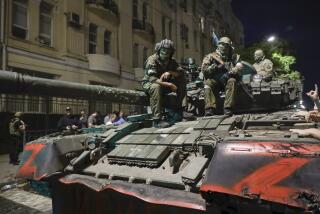While Washington Sizzles, the <i> Contras </i> Still Burn
- Share via
With Lt. Col. Oliver L. North no longer running the contra war from the White House basement, one wonders what luckless functionary will next take up the task. For, even as the scandal preoccupies Washington, President Reagan has not disavowed the band of soldiers of fortune, arms dealers and gun runners that North assembled to pursue his boss’ elusive goal, the overthrow of the Sandinistas.
There are still thousands of contra troops proceeding with their bloodthirsty dream of a military offensive within a few months, perhaps before February, when the next scheduled confirmation of U.S. funding is due to come before Congress. Visionaries that they are, the contra leaders probably still think that they can establish enough of a beachhead on Nicaragua’s Atlantic coast to rally American public opinion and change Congress’ mind again.
If that seems hopelessly unrealistic, keep in mind the central fact that has been confirmed in the past week’s revelations: The contra war is a United States war.
From the beginning, the contras have been, and continue to be, an American-funded, -organized, -armed and -trained operation, with virtually no autonomy. This was the case even during the two years when Congress cut off official U.S. assistance. They certainly are not an internal, well-rooted Nicaraguan resistance with marginal foreign backing.
The amount of dollars invested in the contras is perhaps the most devastating evidence. If one adds the $27 million in “non-lethal” aid recently provided by Congress, the $13.5 million that has been documented thus far from the Iranian slush fund and a conservative estimate of $1 million per month in “private contributions,” the contras would have received more than $50 million during the last year. In all likelihood, they received much more, but even this amount clearly makes the guerrillas handsomely funded by historical Central American standards.
It is worth recalling that whatever President Reagan may think about the threat that Nicaragua represents to the United States, it is a country of fewer than 3 million inhabitants, and its gross national product today is probably below $2 billion. Fifty million dollars a year should go a long way for a country of that size.
It hasn’t, and the contras will increasingly be hard pressed to explain why, having received assistance of this magnitude, they have taken or held not an inch of Nicaraguan territory, established no presence in the country’s cities and obtained no international diplomatic recognition. Until the Iran arms scandal broke, many Americans wanted to see for themselves what the contras could do with “adequate “ funding. There is no need to wait until next year for the answer.
The important question raised in the past week has to do with the contras’ true nature. Are they a CIA-National Security Council show? Or did they simply get a little help from their friends, including Argentine army “dirty war” specialists, just to get started, but with time have learned to fly on their own?
In a sense the contra leadership finds itself in a Catch-22 situation. If they acknowledge that they knew that their money was coming from overpriced U.S. arms sales to Iran, they would place themselves in the worst possible light with their true mentor, American public opinion. But if, after five years of war and U.S. backing, the same contra leadership feigns ignorance, or really proves not to know the truth about its finances, logistics, arms purchases and deliveries--who is in charge?
This only corroborates what the governments of Latin America, which have systematically refused to recognize, support or even meet publicly with the contras, have known since 1981. The so-called “Nicaraguan resistance” is not very Nicaraguan, not very resistant and, given present U.S. political realities, not a very good horse to bet on in Central America. The only bet will be on how soon Washington acknowledges its responsibility, and how quickly the U.S. government extricates itself from Col. North’s little war.
More to Read
Sign up for Essential California
The most important California stories and recommendations in your inbox every morning.
You may occasionally receive promotional content from the Los Angeles Times.













